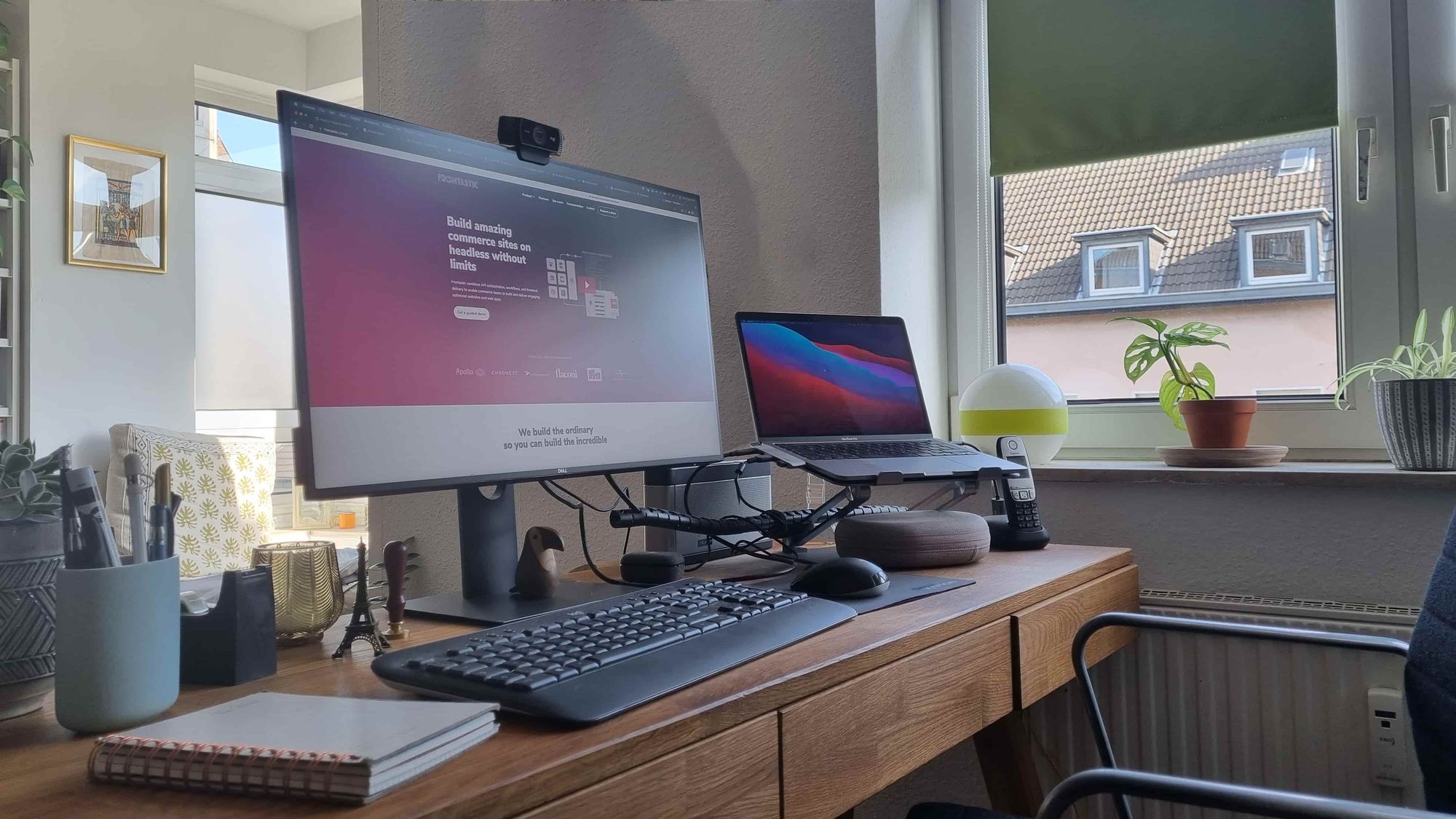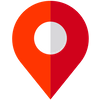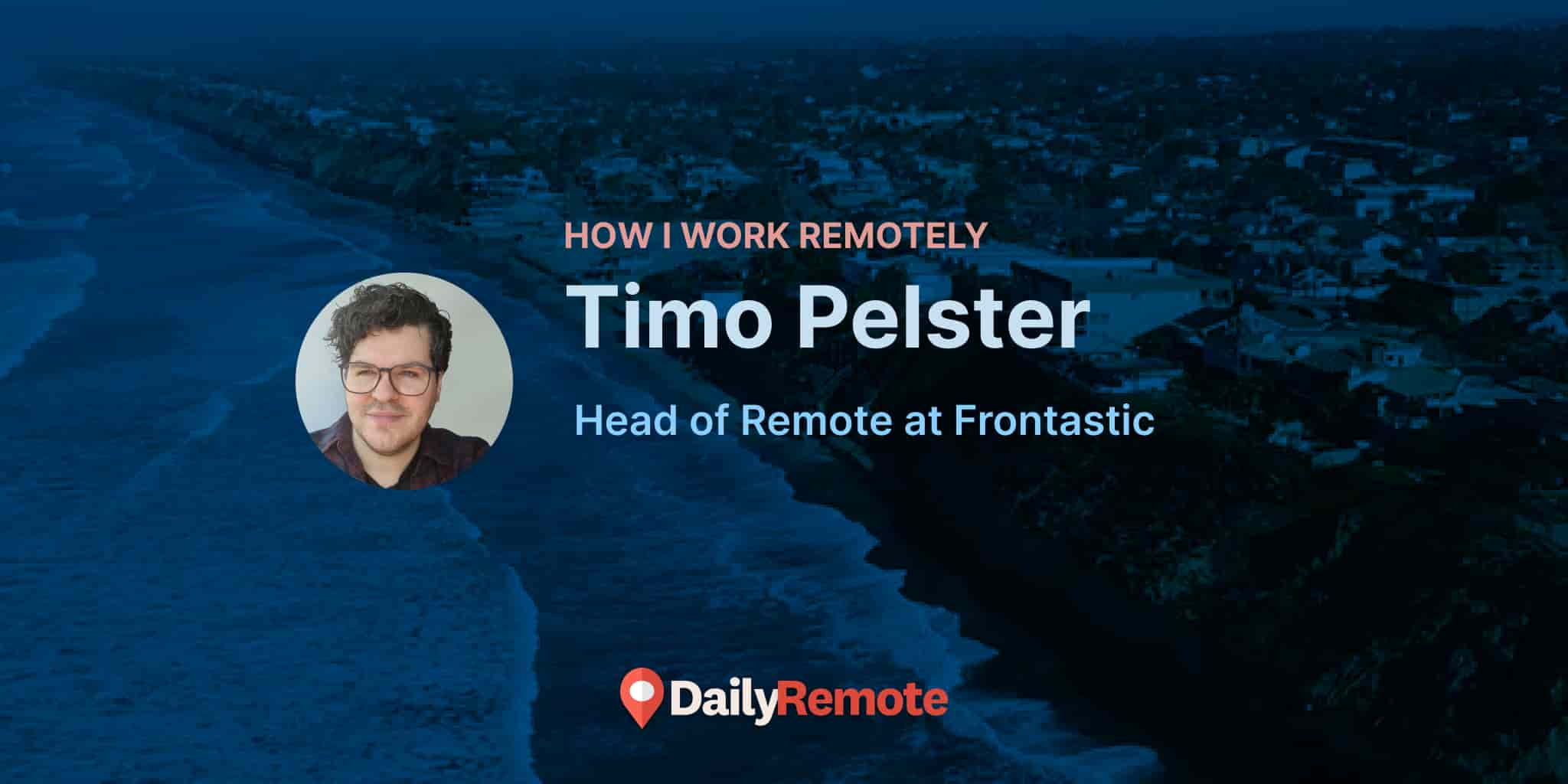Introduction:
My name is Timo Pelster; I’m 31 years old, living in and working from Cologne, Germany. I’m married to my wonderful husband, enjoy cooking and nature a lot, and always strive to make the world a better place.
Current Gig?
I’m working with Frontastic - the Composable Frontend Platform - as Head of Remote. Currently, we’re a team of 41 people working remotely from 13 countries.
Current Location?
Cologne, Germany
Where can we follow you on the Internet?
Describe how you work in 10 words or less?
Empathic, open, optimistic, focused, async-first, connected, intuitive, trusting.
Tell us a little bit about your background & how did you get started with remote work?
My career started in the media industry. I went from online marketing to product development and took on responsibility for corporate ventures, focusing on deal sourcing for organizational development and change management. Afterward, I went into international customer experience projects for an agency with customers like Volkswagen or Gentex.
In June 2019, I was offered to join Frontastic remotely in an early stage and started building the business operations together with their COO, Henning Emmrich. I worked in on-site and hybrid environments before but experiencing the value of well-designed remote setups, made me grow into remote advocacy.
What job responsibilities do you have?
My responsibility is all things remote, culture, and processes. I aim to maintain a great remote culture as we grow, knowing that each person adds something new, and we are constantly changing as a company. I want our organization to be considered best for remote working.
My role basically covers parts of our organizational development, process design, automation, tooling, developing our ways of working and leading the onboarding for new team members. But to make a remote environment work, the main focus is on the people, how we bond, how we grow individually and as a team. Great remote culture isn’t just imitating the on-site experience but makes the difference.
Take us through your typical weekday?
I am an early bird. On a typical weekday, I start around 6, always depending on the other variables in my day. So the first thing is an async standup in Slack.
My workday usually has a maximum of 1-2 hours of internal synchronous time, though it tends to be less. We use Remeet to keep our internal meetings short and automatically scheduled based on availability and urgency. Most of the day, I work from my office at home; in between, I like to work from cafes, the nearby park, or occasionally in co-working spaces. I try to prepare a quick lunch around noon and take a short walk.
I often have music or a podcast playing on the side. What else I need: a good coffee in the morning and a spontaneous chat with great people from the team or my network in between. Sometimes I join an all-hands lunch or virtual social activities.
I usually call it a day around 3 pm but stay available for urgent issues.
What’s your workspace setup like?
My workspace is next to our living room and is only separated by a flexible wall, allowing me to work in a large, very bright space. During the day, I can see the hustle and bustle of people in the center of Cologne from my window - sometimes, a quick look outside helps me reframe my thoughts. Otherwise, I have set up my workplace so that I can work with peace and focus.
I’ve already briefly described the technical setup. In addition, there’s the desk, a wireless keyboard, a mouse, a notebook holder, and a Vitra chair. For when I want to work standing up, I’ve recently discovered Standsome for myself.

What apps, gadgets, or tools can’t you live without?
Definitely Notion (we don’t only use it at Frontastic, I basically use it for planning my whole life). Also, I can’t live without Zapier, Remeet, and Slack.
How do you keep track of what you need to prioritize?
We use a custom OKR framework at Frontastic. This helps a lot in aligning my work with the objectives we have. In my team, we currently use Asana to keep track of progress on the task level.
How do you recharge or take a break?
During a break: with a quick walk or preparing my own or meeting people for lunch. I can best recharge on weekends with a good book, some quality time with my husband, and spending a lot of time outside.
What are you reading currently? What do you recommend?
I’m currently reading “Humankind - A Hopeful History” from Rutger Bregman. It’s a new perspective on people, assuming that all human beings are basically good and that by thinking the worst of others (like we’re often taught), we bring out the worst in our politics and economics too. I can highly recommend Rutger Bregman and enjoy a lot reading this book.
What do you like to do in your free time?
I enjoy hiking, cooking, and reading inspiring books in my free time. I also love to travel and learning new languages.
Advice for someone who is looking to switch to a remote job?
Three things are essential from my perspective when moving into a fully remote job:
- Choose the company you want to work with based on their values and check thoroughly if they live up to them. Social bonding works best through a shared set of values, and that is even more important remotely where you rarely see each other in person.
- Realize that no one expects you to know how the processes work remotely from day one. In the best case, you have an onboarding buddy to help you find your way around and onboarding documentation that leaves few questions unanswered.
- Communicate consciously. Especially in a remote environment, it's essential to be aware of what the other person knows so you don't over-or under-communicate. Figure out what needs to be synchronous and what works asynchronously, knowing that every synchronous call or chat is an interruption in the other person's day. Appreciate the synchronous time. Be as transparent as possible.
Aside: If you are searching for a remote job, study these common questions remote workers usually ask.
What qualities would you recommend are a must-have for a person seeking a remote job?
The ability to structure oneself, the will to contribute, the desire to achieve something great, the sense of responsibility of an entrepreneur in the company.
What, according to you, are the pros and cons of remote work?
Biggest pros of a well-designed remote organization: the flexibility, focus, and the chance to work with great people from all over the world.
The biggest cons:
- You'll need to invest a lot of energy and time into making social connections work.
- You'll have a fear of missing out sometimes (especially when transparency doesn't work like intended).
- You'll have to find a way to celebrate successes, which obviously can't match the experience of being on-site.
Want to work remotely like Timo? We recommend going over the list of top remote companies hiring right now. If you are searching for a remote job, study these common questions remote workers usually ask.
Facing issues searching for a remote job and don't know where to look? DailyRemote has the latest remote jobs posted in various categories to help you. Also, join like-minded people in our LinkedIn and Facebook community.

